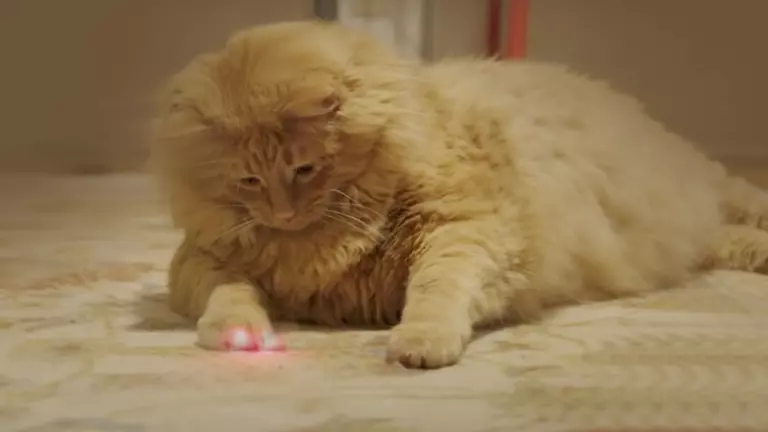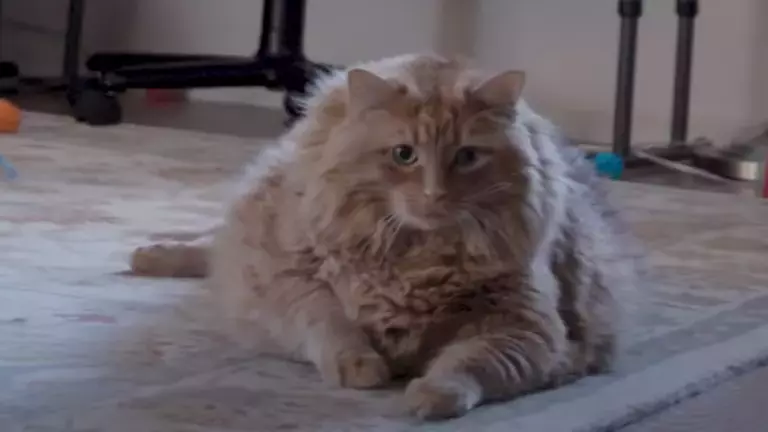It’s not usually clear whether a Maine Coon cat is overweight, because the cat’s build is naturally tall with thick fur. Fat Maine Coon or anyone wondering whether my Maine Coon is overweight, check out the guide above for a detailed guide.
Maine Coon weight around 20 pounds. Maine coon average weight 15 to 25 pounds, and females weight 9 to 14 kilograms. The majority are overfed and the growth rate is very slow for Maine cats, but the average cat is 3-5 years older than the typical. Obese Maine Coons require an unusual dietary regimen.
Table of Contents
Is My Maine Coon Overweight?
A Maine Coon is a large animal that lives in northern Asia. There are two types of Maine Coons, one with a lion-like muzzle and another with a more human-like tail. Both have the same size body and face type, however!
Both have the expression “angry look,” which is caused by the heavy weight of the animal. This look can last a few minutes or hours, even days!

The expression “happy look” is caused by the fact that these animals are social and like to be around other animals. If you have ever had an angry or unhappy cat, you know how impossible it is to get them to relax and let you take care of them!
This article will talk about how to tell if your Maine Coon is overweight or fat.
Review The Guidelines For Determining Body Condition Score
When a fat Maine coon is marked as overweight, it is due to missing weight rather than being over weight. There are two ways to determine if a fat Maine coon is overweight or obese: assess the size of the animal and determine whether it has a condition score.
Condition scores are determined by experts using mathematical and physical criteria. A typical score is 15 to 20% body fat, with 25-35% being the norm!
In order for an expert to assess an animal’s condition score, the doctor or researcher must have used similar methods in the past to determine fit and health.
It is important for an overweight or obese animal to be assessed by an expert because there may be legal ramifications if the veterinarian does not notice anything wrong with the fat Maine coon. Many veterinarians do not use a condition score because they are unsure of what constitutes a healthy fat Maine coon.
Look At Your Cat’s Profile
If your Maine coon is overweight, you should look at his or her profile to see if it’s obese. This describes a cat that is very large in size.
A profile that is too long or short in proportion to its body mass can be obese, too. It usually indicates a larger sized cat.
A fat Maine Coon may have a very large profile because he or she is oversize. A very tall Maine Coon may also have a large profile due to having longer legs and more space between them.
The easiest way to determine if your cat is overweight is by looking at their style of eating. Does he or she consume food in multiple quick sessions, or does he or she take the time to eat slowly? When the answer is yes to both questions, then you know your cat is overfat.
Your Cat Is Normal Weight If Both Of The Following Are True
Your cat is not overweight if he or she is underweight, or too short for your situation.
Being underweight or short can be dangerous. It can lead to medical issues, such as low Taurine which can mean the end of your cat’s life. It may also cause other problems, such as fussiness, lack of interest in things, and even death.
A short fat Maine Coon may not have the correct shape and size to carry a long fat person’s weight. This may result in injuries or even death from weight overload. A long skinny fat Maine Coon might be better suited to their size for distance running, swimming, and playing sports than a short fat one.
It is important to remember that there are different sizes of cats. Some are bigger than others! Make your choice based on what you want in a pet.
Its Skin Is Smooth And Flat Against Its Body
Although most people think a fat Maine Coon is overweight, this is not the case. A fat Maine Coon can look very thin compared to other Maine Coons, making them look overweight.
Because of the shape of their skin, people who notice a fat Maine coon looking overweight may not realize how obese it actually is. This is why it is important to seek medical help if your fat Maine coon looks overweight.
Many people confuse a larger cat with a more intelligent one, like an average sized human being. One way to tell the difference is by how intelligent they are.
There Is No Visible Fat Covering Its Bones
There is no reason for a Maine coon to be overweight. Allhaustly, it is not recommended to keep a Maine coon in an obese condition. Its energy requirements are higher than average, and with no way to meet those requirements without overfeeding, it is recommended to adopt a thinner condition.
It is important to note that there are places where an obese condition is acceptable. Some animal shelters will even choose an overweight Maine Coon over a thin, lean one due to its more protective nature.
Sadly, not all animal shelters understand how obese conditions need to be maintained or what kind of enrichment they require. At some facilities, an overweight condition would be forced on if not taken care of.
Is your cat over thirty pounds? Test your knowledge by looking at their medical records.
Talk To Your Vet About Your Concerns
If your Maine coon is overweight, its veterinarian can run some tests to determine why. These may include a vet scan, blood work, or a diet assessment.
Many veterinarians do annual diet and weight checks to be sure of a pet’s growth. Your vet can easily do this for you every year to be sure of growth and health issues.
While there are few studies on elephantiasis, there are a couple on obesity. If your obese Maine Coon has signs of fat dryness or fat deposition, it may be worth discussing with the vet. He or she can make recommendations on how much weight he or she should lose and whether or not surgery is necessary.
As with any health issue, the best option is to talk to the vet about it and see what results he or she arrives at.
Take Your Cat To The Vet For A Check-Up
If you notice any significant changes in your fat Maine Coon’s health, such as increased difficulty in getting in and out of a down or casey position, then it’s time to bring him or her to the vet.
The best course of treatment for obesity in cats is surgery. Surgeons can typically create two types of surgeries: vertical incision techniques and horizontal incision techniques.
A vertical incision technique is where the vet cuts into the cat’s skin at a medium angle and creates a surgical cut along the top of the body. A horizontal cut is where the vet makes a surgical cut on one side of the body, then cuts across to create a new incision.

Both types of surgery have their benefits and challenges. The cutting out process can be uncomfortable for your cat, depending on how much they are able to stand up on their feet. When undergoing surgery, it is important that it is done correctly.
Monitor Your Cat’s Weight Over Time
As your Maine Coon gets older, it is important to monitor its weight. This can be tricky, as weight can be a sign of age.
Many older cats gain a lot of weight when food and water intake is low. This can happen often enough that it becomes a concern for how much he will eat and how much he will want to show off by eating too much.
When food and water intake are normal, he may be eating enough. If he is overweight, then you should definitely pay more attention to his diet and exercise to prevent obesity stall symptoms such as excessive fat around the neck and body.
It is important to know when your cat is full or has had enough food or water session-wise, so you can make sure they are healthy for the rest of their lives.
How Can I Help My Maine Coon Lose Weight?
To help your Maine Coon lose weight, you can follow these steps:
- Consult a veterinarian: They can assess your cat’s overall health and provide recommendations based on its individual needs.
- Change their diet: Offer your Maine Coon a balanced, low-calorie diet and measure out portions to control their food intake.
- Increase physical activity: Encourage your Maine Coon to exercise more through play, interactive toys, and short walks on a harness.
- Avoid treats and table scraps: Stick to a structured feeding schedule and don’t give your cat any extras that could add extra calories to their diet.
- Monitor progress: Regularly weigh your Maine Coon and track their progress to ensure that they are losing weight at a healthy pace.
It’s important to remember that rapid weight loss can be dangerous for cats, so it’s best to work with a veterinarian to develop a safe and effective weight loss plan.
How Much Exercise Does A Fat Maine Coon Need?
A fat Maine Coon will need more exercise than a cat of normal weight, but the exact amount will depend on several factors, such as its age, overall health, and individual energy levels.
A general guideline is to provide your cat with 30-60 minutes of physical activity per day. This can be achieved through interactive play sessions, short walks on a harness, or the use of interactive toys.
It’s also important to keep in mind that weight loss should occur gradually, so it’s best to start with shorter, less intense exercises and gradually increase the duration and intensity over time.
Consulting with a veterinarian is recommended to determine the best exercise plan for your fat Maine Coon based on its individual needs. Lean More about 25 Ways To Keep A Maine Coon Entertained
Can A Fat Maine Coon Become Bealthy Again?
Yes, a fat Maine Coon can become healthy again with proper care and a commitment to a healthy lifestyle. It’s important to understand that weight loss should occur gradually, at a rate of about 1-2 pounds per month, to ensure that it is safe and sustainable.
With a healthy diet, regular exercise, and a commitment to a healthy lifestyle, a fat Maine Coon can become a happy and healthy cat again.
